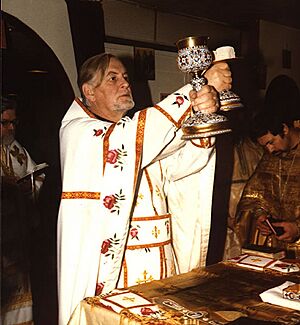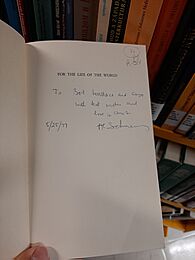Alexander Schmemann facts for kids
Quick facts for kids
Alexander Schmemann
|
|
|---|---|
 |
|
| Born | 13 September 1921 Tallinn, Estonia
|
| Died | 13 December 1983 (aged 62) Yonkers, New York, U.S.
|
| Resting place | St. Tikhon Cemetery, South Canaan, Wayne County (PA), U.S. |
| Nationality | American |
| Occupation | Orthodox priest, theologian, and author |
| Children | Serge Schmemann |
Alexander Dmitrievich Schmemann (Russian: Алекса́ндр Дми́триевич Шме́ман, romanized: Aleksandr Dmitriyevich Shmeman; September 13, 1921 – December 13, 1983) was an important Orthodox priest, theologian (someone who studies religion), and author. He spent most of his life working in the United States.
He was born in Estonia. His family had moved there after the Russian Revolution. He grew up mostly in France, where many Russian families lived in Paris. After studying in both Russian and French schools and universities, he taught in Paris from 1946 to 1951.
In 1951, he moved with his family to New York City. There, he began teaching at Saint Vladimir's Orthodox Theological Seminary. In 1962, he became the dean (head) of the Seminary and stayed in this role until he passed away. For 30 years, his sermons were broadcast into the Soviet Union by Radio Liberty. These broadcasts were a powerful voice from beyond the Iron Curtain, inspiring many.
Schmemann helped create the Orthodox Church in America (OCA) as an independent church. It gained this independence from the Russian Orthodox Church in 1970. Even though he felt strongly Russian, Schmemann wanted the OCA to be open to all people, not just one ethnic group. He believed the Orthodox Church had an important role to play in the Western world. In his teachings, he showed how Christian worship (liturgy) was a deep expression of Christian beliefs.
Contents
Early Life and Education
Alexander Schmemann was born in 1921 in Tallinn, Estonia. He was one of twin boys in a family of Russian immigrants from St. Petersburg. His twin brother was named Andrei. His family moved to Paris, France, when he was a child.
Like many children in the large Russian community there, he first went to Russian-language schools. But Schmemann also chose to attend a French school called a lycée. During this time, he served in the church as an altar boy and subdeacon. This helped him build a strong connection with the church.
In college, he studied the Orthodox Church and Christian history. He focused on the Byzantine and Roman churches. At the University of Paris (1940–1945), he wrote about theocracy (a system of government in which priests rule in the name of God) and the Eastern Roman Empire. He then started graduate studies at St. Sergius Orthodox Theological Institute in Paris.
In 1943, Schmemann married Juliana Osorguine (1923–2017). Her family had also moved to Paris after the Russian Revolution. After their marriage, Schmemann finished his five-year theology program in 1945. He studied with famous theologians like Archpriest Sergei Bulgakov. He was also influenced by important thinkers in French Roman Catholicism.
Alexander and Juliana had three children in France: two daughters and a son, Serge Schmemann, born in 1945. All their children grew up speaking Russian and feeling Russian. They also learned from French and American cultures. The family moved to the United States in 1951. Serge Schmemann later became a journalist. He worked for the Associated Press (AP) and The New York Times in the Soviet Union and Russia.
His Work and Impact
On October 22, 1946, Schmemann became an Orthodox priest. From 1946 to 1951, he taught church history at St. Sergius Institute in Paris. He finished his doctorate degree at St. Sergius Institute in 1959.
Father Georges Florovsky invited Schmemann to teach at Saint Vladimir's Orthodox Theological Seminary. This seminary was in New York City. Schmemann and his family moved to the United States in 1951. Many Russian immigrants came to the US during this time.
Leading the Seminary
In 1962, the seminary moved to Crestwood, New York. Father Alexander was chosen to be the dean (head) of the seminary. He held this important job until he died. He also taught at other universities in New York, like Columbia University and New York University. This helped connect the Orthodox Church with other academic groups in America. At St. Vladimir's, he focused on liturgical theology. This means he studied how the Church's worship traditions show Christian faith.
He was also invited to be an Orthodox observer at the Second Vatican Council. This was a big meeting of the Catholic Church held from 1962 to 1965.
Building the Orthodox Church in America
Schmemann taught many future priests at St. Vladimir's. He also played a big part in creating the Orthodox Church in America (OCA). This church started with Russian missionaries in Alaska. Over time, it grew to include Orthodox immigrants from Greece and other parts of Europe.
In 1970, the OCA became independent, or "autocephalous," from the Russian Orthodox Church. This meant it could govern itself. Most other Orthodox churches stayed in connection with the OCA. Since 1970, the OCA has become a truly American church. Metropolitan Theodosius was the first American-born leader of the church. Today, many of its services are in English.
Reaching People Through Radio
Thousands of Schmemann's sermons were broadcast into the Soviet Union. They were heard on Radio Liberty for 30 years. He became very popular with listeners across the Soviet Union. The government tried to stop these broadcasts, but many still listened. One of his listeners was the famous writer Aleksandr Solzhenitsyn. The two men became friends after Solzhenitsyn moved to the West.
Alexander Schmemann was the dean of the Saint Vladimir's Orthodox Theological Seminary when he passed away. He died from cancer in 1983 in Crestwood, New York.
His Books and Writings
Father Schmemann wrote many books and articles. Some were for general readers. His book For the Life of the World is a very popular book about Christian faith and worship. It has been translated into eleven languages. This book was even secretly published in the Soviet Union.
His book The Eucharist was finished just before he died. Several collections of his writings were published after his death.
- Introduction to Liturgical Theology (1961)
- The Historical Road of Eastern Orthodoxy (1963)
- Great Lent: Journey to Pascha (1969; revised ed. 1974)
- For the Life of the World: Sacraments and Orthodoxy (1970)
- Liturgy and Life: Christian Development Through Liturgical Experience (1974)
- Of Water and the Spirit: A Liturgical Study of Baptism (1974)
- Ultimate Questions: An Anthology of Modern Russian Religious Thought (1977)
- Church, World, Mission: Reflections on Orthodoxy in the West (1979)
- The Eucharist: Sacrament of the Kingdom (1988)
- Celebration of Faith: I Believe... (1991)
- Celebration of Faith: The Church Year (1994)
- Celebration of Faith: The Virgin Mary (1995)
- The Journals of Father Alexander Schmemann 1973–1983 (2000)
- Our Father Translated by Alexis Vinogradov (2001)
- Liturgy and Tradition Theological Reflections of Alexander Schmemann Edited by Thomas Fisch (2003)
- O Death, Where Is Thy Sting Translated by Alexis Vinogradov (2003)
- The Liturgy of Death Edited by Alexis Vinogradov (2017)
- A Voice For Our Time: Radio Liberty Talks, Volume 1 Translated by Alexis Vinogradov and Nathan Williams (2021)
Lasting Impact
Father Schmemann received the title of protopresbyter. This is the highest honor for a married Orthodox priest. He also received honorary degrees from several universities, including Butler University and Lafayette College.
His work is still studied in theology schools today. In 2018, a course called "The Liturgical Theology of Alexander Schmemann" was offered in Toronto.
In 1984, soon after he died, the CBS network made a documentary about him and his work. It was called The Spirit of St. Vladimir's.
You can find many of his books for free online on Internet Archive and Project Gutenberg.
See also
- Sergei Bulgakov
- Divine Liturgy
- Eastern Orthodox Christian theology
- Eucharistic theology
- Pavel Florensky
- Georges Florovsky
- Thomas Hopko
- Vladimir Lossky
- John Meyendorff
- Michael Pomazansky
- John Romanides
 | DeHart Hubbard |
 | Wilma Rudolph |
 | Jesse Owens |
 | Jackie Joyner-Kersee |
 | Major Taylor |


